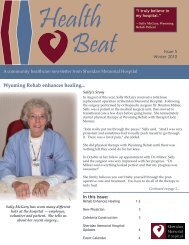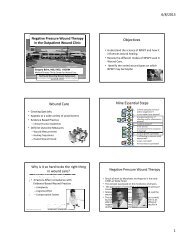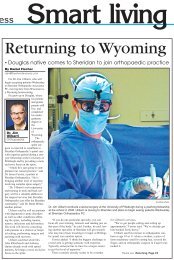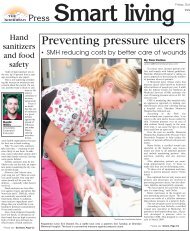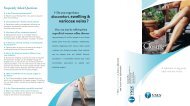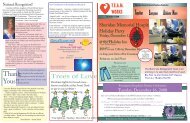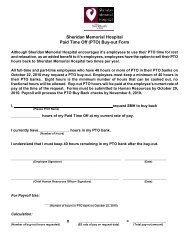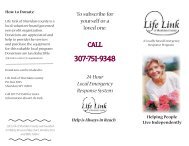Layout 1 (Page 1) - Sheridan Memorial Hospital
Layout 1 (Page 1) - Sheridan Memorial Hospital
Layout 1 (Page 1) - Sheridan Memorial Hospital
Create successful ePaper yourself
Turn your PDF publications into a flip-book with our unique Google optimized e-Paper software.
Smart living<br />
THE<br />
SHERIDAN Press Friday, May 16, 2008<br />
B8<br />
Information now a click away<br />
• Patient Channel<br />
at <strong>Memorial</strong> allows<br />
for better access<br />
By Danae Brandjord<br />
Marketing Manager, <strong>Memorial</strong> <strong>Hospital</strong><br />
Imagine … having access to helpful information on a variety<br />
of health issues right from your hospital bed … accessing a short,<br />
informative video clip on your home computer about what to<br />
expect in a mammogram … calling a toll-free number to ask a<br />
qualified professional a health-related question.<br />
All of these options are available in <strong>Sheridan</strong>.<br />
According to Nancy Hooge, clinical nurse educator at<br />
<strong>Sheridan</strong> <strong>Memorial</strong> <strong>Hospital</strong>, the Patient Channel is now available<br />
for patients and their families at the hospital.<br />
This 24-hour patient-education TV channel provides network-quality<br />
programming on a variety of health topics delivered<br />
specifically to hospital patient rooms and waiting rooms.<br />
Some of the topics include cancer, asthma, diabetes, heart<br />
disease, high blood pressure, smoking cessation, parenting, wellness<br />
and many more. New programs are added throughout the<br />
year.<br />
Additionally, Hooge said the patient channel has a Web site<br />
where this educational content can be accessed (www.thepatientchannel.com).<br />
Video clips on certain topics can be downloaded and there is<br />
a wealth of health information available. There is also a link to<br />
this site from <strong>Sheridan</strong> <strong>Memorial</strong>'s Web site (www.sheridanhospital.org).<br />
Hooge is very excited to have this opportunity available to<br />
patients. “Having access to the Patient Channel is an exciting<br />
addition to our patient-education program here at the hospital.<br />
“There is a wide range of topics offered to assist patients and<br />
their families in broadening their knowledge,” she added.<br />
The content of this channel, a partnership between GE<br />
Healthcare and NBC programming, is closely monitored by<br />
independent advisory boards.<br />
Dave Ross, manager of the Patient Channel, said that the content<br />
quality is high because the boards review all content prior to<br />
airing and identify new opportunities for topics that are contemporary<br />
and of high interest to the general public.<br />
Hooge said the information is important in empowering<br />
patients to take an active role in their health care.<br />
“The Patient Channel and NBC have taken the time to produce<br />
relevant programs that affect a patient's health and wellness.<br />
I am sure our patients, their families and our staff will appreciate<br />
this option in providing education,” she said.<br />
When seeking general medical advice, a personal physician is<br />
always the best resource. Patients often call the emergency department<br />
at the hospital with medical questions.<br />
According to Iris Hehn, emergency department and ICU manager<br />
at <strong>Sheridan</strong> <strong>Memorial</strong> <strong>Hospital</strong>, this puts the staff in an awkward<br />
position because the emergency department staff cannot<br />
give advice over the phone.<br />
“Symptoms alone can be the same for many different medical<br />
diagnoses, and an examination or visual assessment cannot be<br />
done over the phone, so we really can't give them good advice,”<br />
she said.<br />
“We are open 24 hours a day and the staff is eager to serve<br />
patients presenting to the emergency room,” Hehn said.<br />
For simple questions, or if someone just needs a general medical<br />
resource, an Ask-A-Nurse hot line is available to people in<br />
Montana and Wyoming.<br />
The <strong>Sheridan</strong> Press/Michael Sullivan<br />
<strong>Sheridan</strong> <strong>Memorial</strong> <strong>Hospital</strong> Clinical Nurse Educator Nancy Hooge speaks with patient Tony Anthony about the<br />
Patient Channel at the hospital Tuesday.<br />
“We are very fortunate to have access to the Ask-A-Nurse hot<br />
line. It is based out of Billings, Mont., and is toll-free to Wyoming<br />
and Montana residents,” Hehn said.<br />
The toll-free number for the Ask-A-Nurse hot line is (800)<br />
762-8778. Hehn said the hospital phone system only allows calls<br />
to be transferred to other departments within the hospital, and<br />
therefore, the emergency department is unable to transfer a call to<br />
the hot line.<br />
Hehn said Ask-A-Nurse is an excellent resource for general<br />
health questions.<br />
“You can ask simple questions and receive simple answers,”<br />
she said.<br />
It is in the best interest of a patient, when inquiring about a<br />
health-related problem, to seek timely health care. Consulting a<br />
personal physician is the best thing to do, or if it is a life-threatening<br />
situation, call 911.<br />
For more information about any of these resources, contact<br />
<strong>Sheridan</strong> <strong>Memorial</strong> <strong>Hospital</strong>.<br />
Study: Older<br />
brains don’t<br />
benefit from<br />
painkillers<br />
CHICAGO (AP) — Results from a<br />
large government experiment are dimming<br />
hopes that two common<br />
painkillers can prevent Alzheimer’s<br />
disease or slow mental decline in older<br />
people.<br />
The arthritis drug Celebrex and the<br />
over-the-counter painkiller Aleve<br />
showed no benefit on thinking skills,<br />
new findings show. Earlier results from<br />
the same research showed the two<br />
drugs didn’t prevent Alzheimer’s, at<br />
least in the short term.<br />
The experiment was halted several<br />
years early in 2004 when heart risks<br />
turned up in a separate study on<br />
Celebrex. Researchers also had noticed<br />
more heart attacks and strokes in the<br />
people taking Aleve in the Alzheimer’s<br />
prevention study.<br />
Despite the study’s early end, there<br />
was still enough data to hint at how the<br />
drugs act on thinking and memory. The<br />
findings were posted online Monday<br />
and will appear in July’s Archives of<br />
Neurology.<br />
“These were not the results we<br />
were hoping for,” said co-author<br />
Barbara Martin of the Johns Hopkins<br />
Bloomberg School of Public Health.<br />
“We designed this study hoping we<br />
would see a protective effect of these<br />
drugs.”<br />
Researchers hope to continue monitoring<br />
the participants to see if they<br />
find any delayed benefit.<br />
Scientists have speculated that nonsteroidal<br />
anti-inflammatories, such as<br />
Aleve and Celebrex, might prevent<br />
Alzheimer’s by reducing inflammation<br />
in the brain or by other means.<br />
“The drugs have several effects in<br />
the brain and the different effects could<br />
be important at different stages in the<br />
illness,” said study co-author Dr. John<br />
Breitner of the University of<br />
Washington in Seattle.<br />
Nagging via text messages<br />
to help teens remember meds<br />
WASHINGTON (AP) — 4gt yr<br />
meds? Getting kids to remember their<br />
medicine may be a text message away.<br />
Cincinnati doctors are experimenting<br />
with texting to tackle a big problem:<br />
Tweens and teens too often do a lousy<br />
job of controlling chronic illnesses like<br />
asthma, diabetes or kidney disease.<br />
It’s a problem long recognized in<br />
adults, particularly for illnesses that can<br />
simmer without obvious symptoms<br />
until it’s too late. But only now are doctors<br />
realizing how tricky a time adolescence<br />
is for skipping meds, too.<br />
Of necessity, parents start turning<br />
over more health responsibilities to their<br />
children at this age. It’s also an age of<br />
angst, sometimes rebellion, and when<br />
youths may most hate feeling different<br />
from their friends because of medication,<br />
special diets or other therapy.<br />
“It’s a time of so much change in<br />
these kids’ lives,” says Dr. Marva<br />
Moxey-Mims, a specialist in pediatric<br />
kidney disease at the National Institutes<br />
of Health. “It’s very difficult when<br />
you’ve got a life-threatening illness to<br />
say, ‘Let them make their mistakes.”’<br />
There are few good statistics on how<br />
many chronically ill kids don’t adhere<br />
to therapy. But what little data exists is<br />
alarming enough that the NIH’s<br />
National Institute of Diabetes and<br />
Digestive and Kidney Diseases will<br />
bring specialists together in September<br />
to debate next steps:<br />
—Some studies suggest only half of<br />
adolescents, on average, properly follow<br />
treatment steps, says Dr. Dennis<br />
Drotar of Cincinnati Children’s<br />
<strong>Hospital</strong>. The more medications<br />
required or the more troublesome the<br />
side effects — even, for appearanceconscious<br />
teens, such things as weight<br />
gain from steroid medications — the<br />
worse kids adhere.<br />
—Asthma’s record is particularly<br />
bad, with research suggesting as few as<br />
30 percent of teenagers correctly take<br />
medication to prevent asthma attacks.<br />
—Among kidney transplant recipients,<br />
adolescents have the worst longterm<br />
outcomes of any age group, says<br />
Moxey-Mims.<br />
F ACTORY I NVENTORY<br />
R EDUCTION SALE!<br />
Let the Home Place<br />
help you with your<br />
housing needs<br />
Congratulations<br />
Tabitha Shultz and family!<br />
It was a pleasure working with you.<br />
349 Coffeen Ave. • 307.672.1707<br />
<strong>Sheridan</strong> County Community Health<br />
What comes to mind when you hear “public health?” Most people think of<br />
immunizations. Yes, there are the flu clinics and children going to the public<br />
health office to get their school shots. However, community health does much<br />
more than give immunizations! We have many programs to promote healthy<br />
lifestyles and public safety. For example:<br />
• weekly blood pressure clinics<br />
• confidential HIV and Hepatitis C testing and counseling<br />
• TB screenings and followup.<br />
• “Welcome Home” visits to new mothers to be sure everything is going<br />
smoothly<br />
• Best Beginnings program to be sure pregnant women receive the proper<br />
health care<br />
• Children’s Special Health Program provides assistance for children with<br />
special needs<br />
• community health education, including bloodborne pathogen training and<br />
CPR certification<br />
• bicycle and skateboard helmets for a low cost<br />
• visit adults in their homes to monitor health conditions<br />
• emergency preparedness planning in the community.<br />
• evaluations to determine whether someone is appropriate to be placed in a<br />
nursing home.<br />
Most of our nurses serve on at least one committee, board, or coalition in the<br />
community. We do have immunization clinics twice a week in the office. As<br />
you can see, however, your local community health office does much more than<br />
“give shots.” Call us or visit our website for more information on any of these<br />
services! http://sheridancounty.com/info/cw/overview.php • 672-5169


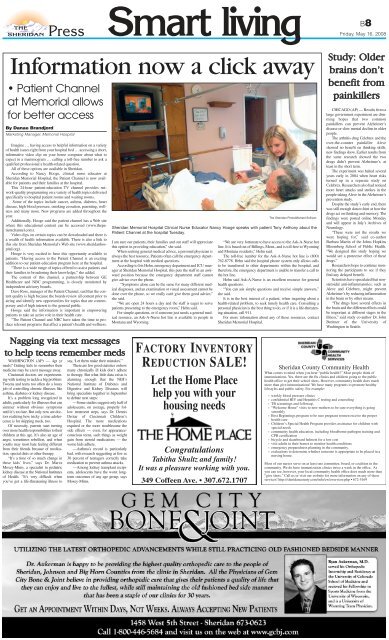
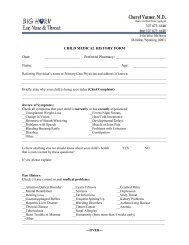
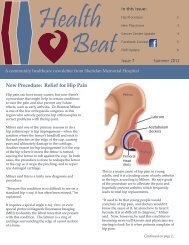
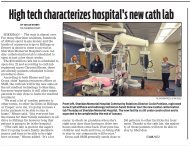
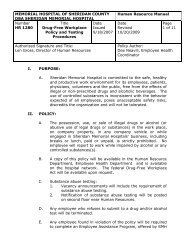

![Adult - Medical History Form [PDF] - Sheridan Memorial Hospital](https://img.yumpu.com/40577874/1/190x245/adult-medical-history-form-pdf-sheridan-memorial-hospital.jpg?quality=85)
